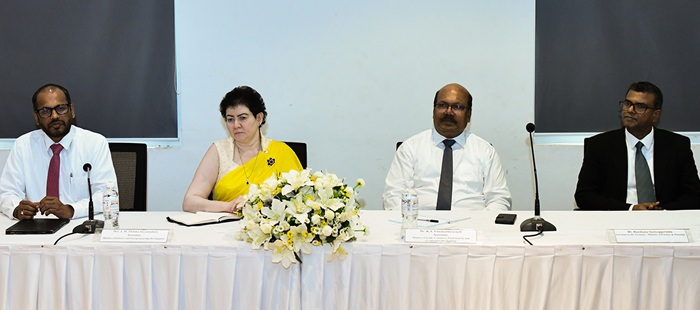
The Sri Lanka Export Development Board (EDB) today held a discussion with high-level government officials and numerous export sector representatives regarding the 20% tariff recently imposed by the United States on Sri Lankan goods.
According to the EDB, the discussion focused on planning future actions to be taken to face the impact of American tariffs.
EDB Chairman and CEO Mr. Mangala Wijesinghe opened the session, emphasizing the importance of a unified program in the export industry to face the tariff challenge.
Strategic addresses by three key government secretaries regarding policies and support mechanisms that the government is set to implement for businesses affected by the American tariff impact were a special feature of this discussion.
Secretary of the Ministry of Finance and Planning, Dr. Harshana Suriyapperuma, provided important insights into the government’s financial strategy to support exporters affected during this challenging period.
Secretary of the Ministry of Industry and Entrepreneurship Development, J.M. Tilaka Jayasundara, provided special insights into industrial adaptation strategies and innovation, while Secretary of the Ministry of Trade, Commerce, Food Security and Cooperative Development, K.A. Vimalenthirarajah, shared views on immediate and long-term trade policy responses.
A special feature of this discussion was the comprehensive presentation on “market opportunities available to Sri Lanka under new American tariffs” presented by Acting Director of Market Development Division, Saumya Kannangara. This presentation outlined the potential for Sri Lankan exporters to diversify their exports to find new market segments, develop alternative trade strategies, and reduce dependence on American markets.
Allocating considerable time for interactive discussion and Q&A, exporters were given the opportunity to raise specific issues, share practical experiences, and present suggestions for innovative solutions.
Rather than viewing the 20% American tariff merely as an obstacle, attention was focused on strategies for market diversification, product innovation, improving operational efficiency, and adding value to maintain competitiveness.
The session concluded with the aim of continuous dialogue, follow-up meetings, and utilizing emerging opportunities in European, Asian, and other international markets while minimizing the immediate impact of tariff restrictions. (Newswire)
